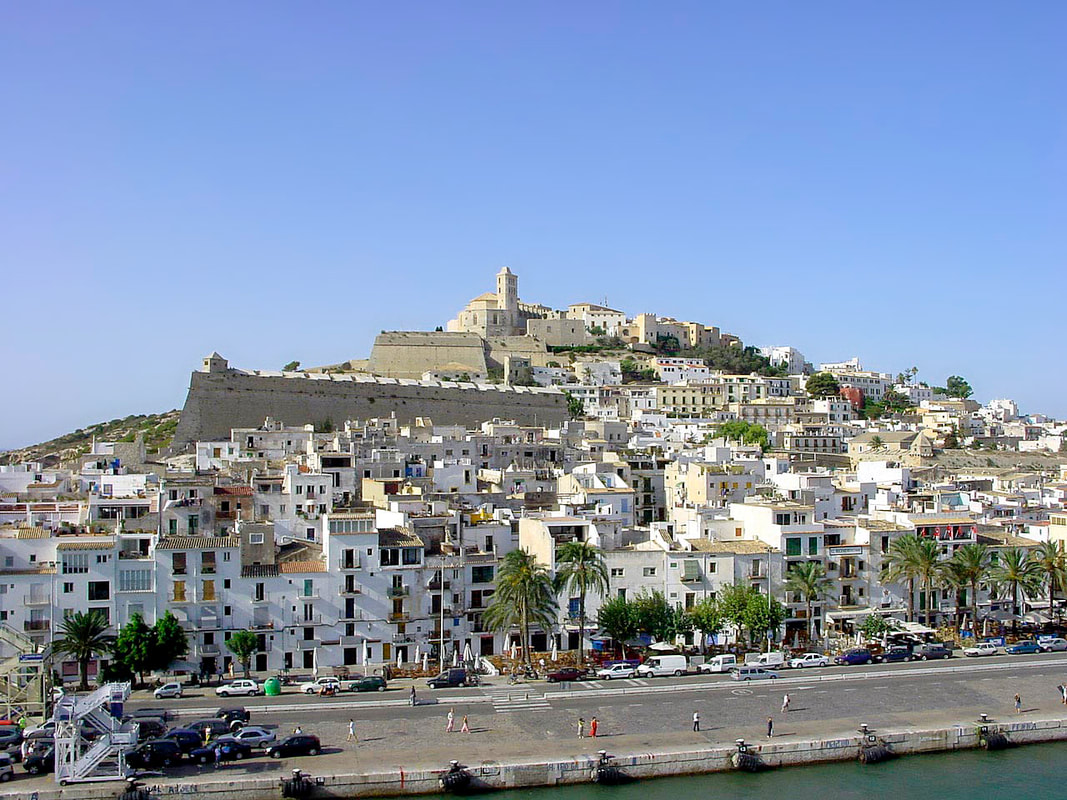Language and Geography (warning - contains TOK)
The words that we use to name places around the world might say more about ourselves than the places we are referring to.
Our use of 'foreign' place names lands us in the middle of a geographical discussion about how we relate to 'other' people. Unlike people, places often have multiple names - so which names do we use and what does our choice of name say about personal knowledge?
|
Now that Calcutta has become Kolkata and Peking has become Beijing, it would appear that the rule is to use the names that most local people use. However, how many people outside of Italy refer to Venezia, instead of Venice?
So, is it wrong to use English names such as Venice or Spain? Surely we should go native? Not according to Chris Patten (see Patten, 1998), who, as the last governor of Hong Kong, insisted on referring to Peking, rather than using the Mandarin version, Beijing. Of course, to many geographers today, this all seems rather neo-colonial, the last unfortunate gasps from a former superpower that was once used to telling people that the places they thought of as their own were now going to be called something alien like Salisbury or Victoria.
So, Beijing it is? Well, not if you live in Hong Kong and Cantonese is your first language. Hong Kong may have been reunited with the motherland but many Hongkongers insist on calling the Chinese capital Bākgìng. For all their lives, many have spoken the Cantonese dialect and most Hongkongers appear to have little intention of switching to speaking Pǔtōnghuà (Mandarin) place names. The likes of Patten might also make the point that if Hongkongers can legitimately use Cantonese names, then why can’t English-speaking people use perfectly reasonable English names like Canton (Guǎngzhōu)? After all, most of us are happy to continue using the English word Cantonese, but perhaps replacing it with “Gwóng jàu wá” might be a bit too demanding? Hong Kong is a great place, with a name that exudes a catchy assonance. There is perhaps no shortage of western people who will delight in telling you that Hong Kong means ‘fragrant harbour’. True, but it might come as something of a surprise to some people to learn that Cantonese people prefer to refer to their territory as Heūng Góng, whilst many people in mainland China call it Xiāng Gǎng. Of course, if you try calling the Hong Kong Special Administrative Region of the Peoples Republic of China “Honkers”, you will probably get into trouble with somebody. This is a pity. Nicknames can be fun. Would Aussies take offence if we referred to Brisbane as “Brizzie”? Isn’t Blighty an Indian nickname for Britain? I would urge that we shouldn't get too carried away with misguided notions of political correctness. I hope that my favourite gin will never be called Mumbai Sapphire and I see no reason to take Peking Duck off the menu. Frustratingly, the rules for referring to places are muddled. For example, China is a word, used in English, for a nation that proudly calls itself Zhōngguó (中国), which literally means the ‘Middle Kingdom’. In contrast, it could be that the name China is an exonym that takes its origins from the Persian word Cin (چین) and was perhaps brought to European attention by Marco Polo. Although our name for the Middle Kingdom is rarely used in what we call China, I know of no broad expectation for geographers to use the Mandarin name for the nation to match the Mandarin name of the capital city. China pairs nicely with Peking, whilst Zhōngguó is consistent with using Běijīng. Our use of exonyms is a bit of a muddle and lacks consistency, except that it is abundantly clear that anybody who insists on referring to Peking, Canton or Bombay is going to be in for a rough ride, at least in Britain. Interestingly, a widely used German atlas (Dierke Weltatlas, 2008) refers to places such as Kanada, Peking, Kanton and Bombay. Overall, little attempt is made to use local variants of place names in German speaking schools. In return, most German people seem happy to let the British carry on using Anglicised German place names such as Cologne instead of Köln. Furthermore, the point has to be made that British political correctness is not always reciprocated. For example, in China, many refer to Britain as Yīngguó (英国). Exotic or post-colonial?
One approach to try to make sense of this perplexing geographical muddle is to see it in the context of post-colonial geographies. Places that were once subject to the plunder of British colonial rule, and for which we feel truly sorry about, are often known by their new post-colonial names. However, a corresponding lack of imperial guilt means that we feel a bit more relaxed about not using local European place names such as, España, Praha or Lisboa. This dual approach maybe regarded as simply pragmatic, it is the status quo. However, it not only lacks consistency, but it makes geographers vulnerable to accusations of perpetuating a patronising approach. Is it right that places in high-income nations are usually named in English, whereas middle and low-income places are a bit more likely to be known by their ‘exotic’ local names? |
The geographer as cultural technologist
If you know where Spojené Království or Le Royaume Uni is found on the map, you might allow yourself to feel just a little bit smug. Although the cosmopolitan can be cast as an élite figure more associated with the white western traveller (see Binnie et al, 2006), I would like to suggest that we geographers should aspire to an open and democratic form of cosmopolitanism. The Greek word kosmopolites, gives us the term “cosmopolitanism” and, in its literal sense, it means “citizen of the world”. Global citizenship and cosmopolitanism are related concepts that we should not ignore. Crucially, a cosmopolitan maybe understood as a cultural technologist, a multicultural expert who has ‘competence with regard to alien cultures’ (Hannerz, 1996: 103). We can take further inspiration from John Urry who casts the cosmopolitan as somebody who has “a cultural disposition involving an intellectual and aesthetic stance of ‘openness’ towards peoples, places and experiences from different cultures, especially those from different nations” (Urry, 2000: 7). To me, this openness means that we should no longer distinguish between places rich and poor, near and far, but that we try to participate in all cultures, a process that starts with the right name. I am concerned that whilst this is a more consistent approach, it is one that demands we hone our skills to become more effective cultural technologists. Dropping English and always using local names is a daunting prospect. Should we only refer to Deutschland and never again mention Germany? That seems improbable. Alternatively, should we bombard people with dual names like “Roma/Rome”? There is a case for being educated to know place names in all their variants. For example, learning the Catalan name “Eivissa” as well as the Spanish (Castellano) name “Ibiza” can be rooted in a genuine desire to be a global citizen who can reach out to connect with all the peoples of the world. A place name too far? If we are to embrace cosmopolitanism, we need to know how far we can safely travel with this project. If we go too far, do we risk disconnecting ourselves from our own language? Here I have used Pīnyīn to refer to Zhōngguó place names. Is there a case for publishers going a step further and printing Beijing as Běijīng or 北京, in much the same way as we would expect place names like Orléans or Köln to have the correct accent marks and diacritics? Learning about geography is already a burdensome task, yet a colleague of mine who teaches Mandarin is adamant in her expectation that we should go further and learn to pronounce Zhōngguó place names with the correct tone. If she is right, then we might need to get used to Pīnyīn with its tonal markers. Cultural island building As a geographer, the word foreign, is to me, one of the least helpful words in the English language. Foreign is a sinister word that takes me nowhere that I want to go; it artificially sets me apart from those I need to know better. Previously, I have argued against a process that I have called ‘cultural island building’ (see, Cox, 2002 and Cox, 2008), where many, construct imaginations of themselves as being different from others who are simply too ‘foreign’ to be a part of their lives. Here I draw inspiration from the German writer, Wolfgang Welsch who argues that we need to transcend what is foreign to celebrate ‘what might be common and connective’ (Welsch, 1999: 201). I would suggest that no place name, or human being, is too ‘foreign’ for us to get to know. If we can become a little more cosmopolitan, we soon find that 'foreigners' are not as foreign as we first imagined. Alongside this, our claims to be indigenous are challenged by the mountain of scientific evidence that points to a common African ancestry. We are not the 'sons of the soil' of the places we inhabit - even if we have lived there for a very long time. Foreign and indigenous are like two ugly sisters that take us nowhere. So, I would argue that knowing the authentic names of places is a fundamental starting point to breaking down cultural barriers and building relationships that bond rather than divide. We need to connect our cultural islands to the mainland. The conventional system of addressing others using place names that are alien to their everyday lives was never that practical or diplomatic. Today, globalisation, especially cultural globalisation, demands that we contribute to global citizenship. To me, this means that we have to participate in what is local, and particular, as a pragmatic means to appreciate what is universal and connective in our common humanity. OpenStreetMap uses local names for its open source maps.
|
References
Binnie, J., Holloway, J., Millington, S. and Young, C. (Eds.) (2006). Cosmopolitan Urbanism. Routledge: London.
Cox, M. (2002) East is East? Teaching Geography, 27, 4, pp. 171-72.
Cox, M (2008) Globalisation: are you for or against it? Teaching Geography, 33, 2, pp. 75-6.
Diercke Weltatlas (2008). Bildungshaus Schulbuchverlage Westermann Schroedel Diesterweg Schöningh Winklers: Braunschweig..
Hannerz, U. (1996) Transnational connections: culture, people, places. Routledge: London & New York.
Patten, C. (1998). East and West: China, Power, and the Future of Asia. Macmillan: London.
Urry, J. (2000). “The Global Media and Cosmopolitanism” Paper presented at: Transnational America Conference, Bavarian American Academy, Munich, June 2000. Published by the Department of Sociology, Lancaster University at http://www.lancs.ac.uk/fass/sociology/papers/urry-global-media.pdf. Last accessed 10 November, 2010.
Welsch, W. (1999) Transculturality: the puzzling form of cultures today. In Featherstone, M. & Lash, S. (Eds.) Spaces of culture: city, nation, world. Sage: London.
Binnie, J., Holloway, J., Millington, S. and Young, C. (Eds.) (2006). Cosmopolitan Urbanism. Routledge: London.
Cox, M. (2002) East is East? Teaching Geography, 27, 4, pp. 171-72.
Cox, M (2008) Globalisation: are you for or against it? Teaching Geography, 33, 2, pp. 75-6.
Diercke Weltatlas (2008). Bildungshaus Schulbuchverlage Westermann Schroedel Diesterweg Schöningh Winklers: Braunschweig..
Hannerz, U. (1996) Transnational connections: culture, people, places. Routledge: London & New York.
Patten, C. (1998). East and West: China, Power, and the Future of Asia. Macmillan: London.
Urry, J. (2000). “The Global Media and Cosmopolitanism” Paper presented at: Transnational America Conference, Bavarian American Academy, Munich, June 2000. Published by the Department of Sociology, Lancaster University at http://www.lancs.ac.uk/fass/sociology/papers/urry-global-media.pdf. Last accessed 10 November, 2010.
Welsch, W. (1999) Transculturality: the puzzling form of cultures today. In Featherstone, M. & Lash, S. (Eds.) Spaces of culture: city, nation, world. Sage: London.
Photo credit: Charlie Costello, Unsplash



